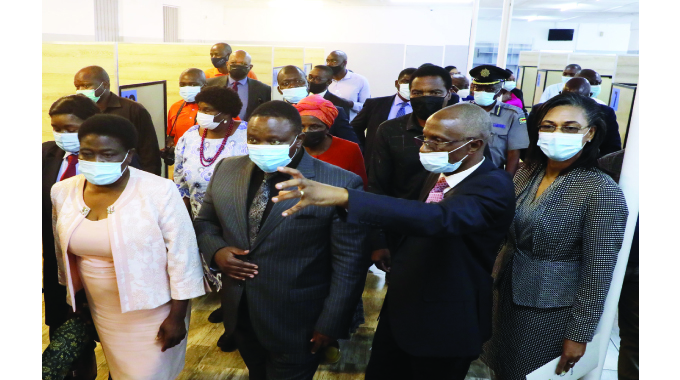WATCH: Govt opens state-of-the-art Byo e-passport facility

Mashudu Netsianda, Senior Reporter
A state-of-the-art e-passport bio-enrolment centre was officially opened yesterday at the Bulawayo Provincial Civil Registry offices as Government moves to decentralise access to travel documents in line with the devolution thrust.
As of yesterday, members of the public had already started applying for the e-passports in Bulawayo.
An ordinary e-passport, which costs US$120, takes seven working days to be processed while the emergency one costs US$220 and is out within 48 hours.
Prior to the latest development, e-passports were obtained in Harare only.
The e-passport scheme was launched by President Mnangagwa in December last year after the Government entered into a partnership with a Lithuanian company, Garsu Pasaulis, on a build, operate and transfer (BOT) basis to produce the new passports that meet modern international standards and allow Zimbabweans to travel without additional complications.
The switch-over will also eliminate the large backlog of application built-ups during the lockdowns.
In addition, an online passport application system will be introduced, to allow applications and payment for the documents online.
An electronic passport or e-passport contains an electronic chip, which holds the same information that is printed on the passport’s data page.
It contains the holder’s name, date of birth, and other biographic information.
An e-passport also contains a biometric identifier.
All of these features are designed to protect citizens from identity theft because it is difficult and expensive to steal the information stored on the document’s encrypted digital record.
E-passports also allow for faster passage through transit at your home border post.
The partnership will also see Garsu Pasaulis refurbish provincial and district registry offices and provide material to produce national identity cards.
Officially opening the Bulawayo e-passport bio-enrolment centre, Home Affairs and Cultural Heritage Minister Kazembe Kazembe said the launch and implementation of the e-passport project resonates with the National Development Strategy One (NDS1) objective of modernising the economy through the use of ICTs and digital technology, as the country rallies towards the attainment of Vision 2030.
He said decentralising passport services to the district level remains a top priority for Government and has started with the establishment of Chitungwiza Passport Office, which is now operational.
“The roll out of the e-passport project started in Harare and Bulawayo is the second province to have the facility, which will be cascaded to other provincial and district centres,” said Minister Kazembe.
He said the process of setting up infrastructure for the issuance of e-passports has now been taken to Hwange and Lupane, in Matabeleland North Province.
This will be followed by a similar exercise to the remaining seven provincial offices, which should be up and running by end of June this year.
“Initially, e-passport applications will be processed at provincial and a few district centres.
Plans are, however, afoot to decentralise e-passport enrolment services to all districts in our drive to take services to the people in line with the dictates of devolution,” said Minister Kazembe.
He said the challenges being experiencing by citizens in trying to acquire travel documents will soon be a thing of the past.
“I must assure you, however, that with the decentralisation of the e-passport enrolment centres, the long queues that have been witnessed at passport offices will soon be a thing of the past.
My ministry is also focused on contributing optimally towards the ease of doing business through the deployment of online platforms, which are critical towards the realisation of enhanced service delivery,” said the minister.
“In this regard, my ministry is working on plans to establish an online passport application system for the convenience of the general public.”
Acting Registrar-General Mr Henry Machiri said since the Civil Registry Department commenced issuance of e-passports on January 18 this year, they have so far, produced 26 395 documents.
Out of that number, a total of 13 886 are female applicants and 12 509 male.
He said the Civil Registry Department plays a pivotal role in complementing Government efforts towards the attainment of Vision 2030 through computerisation and decentralisation of services for both citizens and non- citizens.
“The department has decentralised issuance of vital civil registration documents to 10 provinces, 62 districts and 206 sub offices across the country to accelerate service delivery,” said Mr Machiri.
Despite the positive gains having been realised in the seamless transition to the e-passport, Minister Kazembe said the Government is deeply concerned about criminal elements purporting to be employees or agents of the Civil Registry Department and defrauding citizens of their hard-earned cash by promising to facilitate them acquire e-passports and identity documents for a fee.
“I wish to unequivocally state that these bogus individuals do not, in any way, represent the ministry and we disassociate ourselves from them.
Members of the public are urged to approach the Civil Registry directly when seeking access to civil registration and to desist from engaging intermediaries,” he said.
“Let me, however, assure you that law enforcement agents will leave no stone unturned in bringing these criminal elements to book.”
Minister Kazembe said the introduction of the new generation e-passport is fully compliant with the International Civil Aviation Organisation (ICAO) standards and has enhanced security features to abate fraudulent activities.
“Zimbabwe is a member of the ICAO, which requires that member states take necessary measures to ensure the integrity, authenticity and security of travel and identity documents,” he said.
Each page of the passport chronicles a story about Zimbabwe’s rich cultural heritage and major tourists’ attractions and security thread fully embedded in the inner booklet pages.
Minister Kazembe said the enhanced security features will play a major role in combatting cross-border organised crime and illegal migration, thus, bringing integrity to the country’s migration system.
He said the Government, through the Civil Registry Department, has a constitutional obligation to ensure that every eligible person is bestowed with legal identity.
The minister urged members of the public to take advantage of the nationwide mobile registration exercise, which starts on April 1 to September 30.
“We cannot talk about e-passports without mentioning the initial source documents used in the processing of passports, which are birth certificates and national identity documents.
“In that vein, I take great pleasure to inform the nation that the Civil Registry Department will be embarking on a nationwide mobile registration exercise from April 1, 2022 to September 30, 2022,” he said.
The exercise will mainly focus on the issuance of births and deaths certificates and national identity documents. In addition to mobile teams, all static registration offices will remain operational during this period.
Accessing identity cards has of late become a terrible nightmare for people in Bulawayo with only 40 people being served per day.
The number of people being attended to per day is, however, way below the hundreds who throng the offices daily to acquire the document.
Bribes are openly being demanded upfront by officials who are using some informal traders operating at the Civil Registry offices as fronts.
-@mashnets
Ends CKD PN








Comments